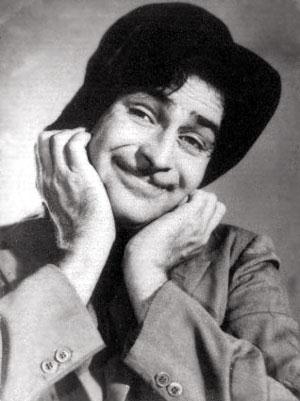
| Name |
Raj Kapoor |
| Height |
|
| Naionality |
Indian |
| Date of Birth |
14 December 1924 |
| Place of Birth |
Peshawar, British India |
| Famous for |
Acting |
Ranbir Raj Kapoor , also known as The Show-Man, was an Indian film actor, producer and director of Hindi cinema. He was the winner of nine Filmfare Awards, while his films Awaara (1951) and Boot Polish (1954) were nominated for the Palme d'Or at the Cannes Film Festival. His performance in Awaara, was ranked one of the "Top-Ten Performances of all time", by the Time Magazine. The Government of India honoured him with the Padma Bhushan in 1971 and the Dadasaheb Phalke Award in 1987 for his contributions towards Indian cinema.
Raj Kapoor was born in Peshawar, British India (present day Pakistan), to actor Prithviraj Kapoor and Ramsarni (Rama) Devi Kapoor (née Mehra). He was the eldest of six children in a Punjabi family. He was the grandson of Dewan Basheshwarnath Kapoor and great-grandson of Dewan Keshavmal Kapoor, part of the famous Kapoor family. Two of Raj's brothers are actors Shashi Kapoor (a.k.a. Balbir Raj Kapoor) and the late Shammi Kapoor (aka Shamsher Raj Kapoor); the other two died in infancy. He also had a sister named Urmila Sial.
Raj Kapoor attended Colonel Brown Cambridge School, Dehradun in the 1930s.
At the age of eleven, he appeared in films for the first time, in the 1935 film Inquilab. After acting in several other films the next 12 years, Raj Kapoor's big break came with the lead role in Neel Kamal (1947) opposite Madhubala in her first role as a leading lady. In 1948, at the age of twenty-four, he established his own studio, R. K. Films, and became the youngest film director of his time making his directorial debut with the film Aag. Aag marked the first of many films in which he and Nargis appeared together. In 1949 he co-starred alongside Dilip Kumar in Mehboob Khan's blockbuster Andaz which was his first major success as an actor.
He went on to produce, direct and star in many box office hits such as Barsaat (1949), Awaara (1951), Shree 420 (1955), Chori Chori (1956), Jagte Raho (1956) and Jis Desh Men Ganga Behti Hai (1960). These films established his screen image as The Tramp modeled on Charlie Chaplin's most famous screen persona. In 1964 he produced, directed and starred in Sangam which was his first film in colour. This was his last major success as a leading actor. Outisde of his home productions his other notable films were Anari (1959), Chhalia (1960) and Teesri Kasam (1963). He produced, directed and starred in his ambitious film, Mera Naam Joker (My name is Joker), which took more than six years to complete. When released in 1970, it was a box office disaster.
In 1971 he launched his eldest son Randhir Kapoor in Randhir's acting and directorial debut Kal Aaj Aur Kal which also starred Raj's father Prithviraj Kapoor as well as Randhir's would-be-wife Babita. He launched his second son Rishi Kapoor's career when he produced and directed Bobby (1973) which was not only a huge box office success but also introduced actress Dimple Kapadia, later a very popular actress, and was the first of a new generation of teen romances. Dimple wore bikinis in the film which was quite unique for Indian films then.
In the latter half of the 1970s and early 1980s he produced and directed films which focused on the female protagonists: Satyam Shivam Sundaram (1978) with Zeenat Aman, Prem Rog (1982) with Padmini Kolhapure and Ram Teri Ganga Maili (1985) which introduced Mandakini. He acted in fewer films by the late 1970s and early 1980s and focused on producing and directing films. He starred alongside Rajesh Khanna in Naukri (1979) and played the title role alongside Sanjay Khan in Abdullah (1980).
Raj Kapoor's last major film appearance was in Vakil Babu (1982) where he appeared with his younger brother Shashi. His last acting role was a cameo appearance in a 1984 released British made-for-television film titled Kim.
Raj Kapoor suffered from asthma in his later years; he died of complications related to asthma in 1988 at the age of 63. At the time of his death, he was working on the movie Heena (an Indo-Pakistan based love story). The film was later completed by his sons Randhir and Rishi Kapoor, and narrated by his brother Shammi Kapoor. The movie was released in 1991 and became a huge success at the Box Office. When he was given the Dadasaheb Phalke Award, where his brothers Shashi Kapoor and Shammi Kapoor were also present, the crowd was clapping around when President Venkataraman, who saw Kapoor's discomfort, came down the stage to give the award to the legend in the middle of thundering claps where he was breathing his last breath. And suddenly Kapoor collapsed, and was rushed to the All India Institute of Medical Sciences for treatment. The country's top cardiologists tried their best, but could not save him.
